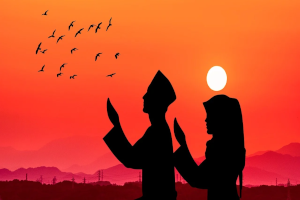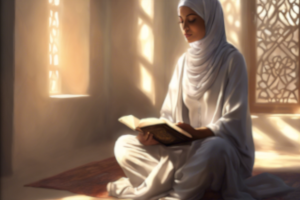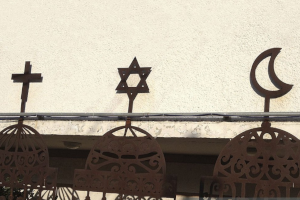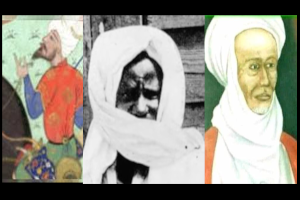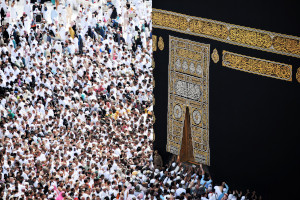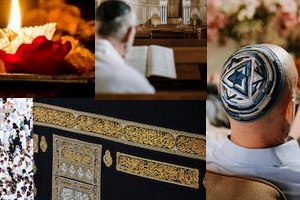Supplication, or *du’a*, holds a special place in the life of a Muslim. It is a personal, direct conversation with Allah, where one can express gratitude, seek guidance, and ask for help. While *du’a* can be made at any time, there are specific moments in a Muslim’s daily and weekly routine, as well as during particular occasions, when Supplications are believed to be especially powerful. The best times for supplications to God 1. During the Last Third of the Night The last third of the night, before the pre-dawn meal…
Read MoreCategory: Spirituality
Powerful Supplications for Forgiveness and Repentance in Islam
Repentance is the beginning of faith, it is the beginning of the life of a person who decides to walk in the path of religion. We are all sinners and the creator’s main attribute is that he is oft forgiving. Thus Allah says in Surah Al-Zumar (39:53): “Say, ‘O My servants who have transgressed against themselves [by sinning], do not despair of the mercy of Allah. Indeed, Allah forgives all sins. Indeed, it is He who is the Forgiving, the Merciful.’” Repentance is considered as the…
Read MoreReligion: A Source of Stability in a Chaotic World
In a world marked by rapid change, uncertainty, and upheaval, many individuals find themselves grappling with a sense of instability and disorientation. From global crises to personal challenges, navigating the complexities of modern life can often feel overwhelming. In such turbulent times, the role of religion as a source of stability becomes increasingly significant. Despite the myriad of belief systems and practices, one common thread unites them all: the ability of religion to offer solace, guidance, and a sense of grounding amidst chaos. Finding Anchors in Times of Uncertainty…
Read MoreShifting Boundaries of Inter-religious Cooperation
Just as relationships between individuals require cooperation to thrive, so too must understanding and collaboration exist between different religious traditions in order to build a more just, compassionate and peaceful world. However, determining appropriate levels of inter-religious engagement poses complex challenges that necessarily involve navigating shifting boundaries over time. Willingness to cooperate across religious divisions depends on negotiating these delicate borders responsibly and respectfully. In many areas, boundaries have expanded considerably regarding inter-religious cooperation. Interfaith dialogue and learning about differing beliefs have become widely embraced as positive ways to reduce…
Read MoreParallel Paths: The Evolution of Islam through the Lives of Shah Jalal, Cheikh Ahmadou Bamba, and Modibo Adama
Introduction: Islam, as a religion, has evolved over centuries, adapting to various cultures and regions while maintaining its core principles. Examining the lives of influential figures like Shah Jalal, Cheikh Ahmadou Bamba, and Modibo Adama offers a fascinating insight into how Islam took root and flourished in diverse parts of the world. Despite geographical distances and cultural disparities, these individuals played pivotal roles in shaping Islamic traditions and practices in their respective regions. Shah Jalal: Born in the 14th century in present-day Bangladesh, Shah Jalal was a Sufi mystic and…
Read MoreIslam is simple
Islam, as a monotheistic Abrahamic faith, is often celebrated for its simplicity in guiding believers on the path of righteous living. At its core, Islam provides a straightforward framework that emphasizes unity, compassion, and devotion. Let’s delve into some key aspects that highlight the simplicity of this venerable religion. 1. Oneness of God (Tawhid): Central to Islam is the concept of Tawhid, affirming the absolute oneness of God. This uncomplicated belief serves as the cornerstone of the faith, emphasizing a direct and unambiguous relationship between the individual and the…
Read MoreWhat happens when we die?
From ancient civilizations till the modern age, the believe that he dead are not completely gone has resist and transcended time and space. Thus the ancient Egyptians, one of the earliest civilizations, believed that there is something in human beings that will survive death. In many earlier cultures the dead were considered still capable of interacting with the living somehow. The world’s major monotheistic religions are not an exception. Christianity teaches that those who accept Christ will be rewarded with eternal bliss after death. And according to Islam, the…
Read MoreNo science or politics should replace God
We are living in a world where technology offers so many possibilities that some people can do in a few days things that you would have needed years to achieve in the past decades. From fast planes and trains and cars as well as other modern transportation means to effective communication, from appliances till all kinds of household gadgets with huge computational capacities, human creativity has produced a lot of help and assistance to the population. In the same time, the world food program estimates that more than 800 million…
Read MoreReligions for peace
Religions could serve peace and prevention of conflicts or even abolish wars. But our religions have been subordinated by political leaders to their own individual interest. Moreover, the possibility to establish universal peace probably harms the business of weapon manufacturing and trafficking. It is therefore not an easy task to prevent some conflicts and completely stop wars. It should be clear that there is no real winner of war. After that Iraq , Syria, Libya and many other countries were devastated by war, the promises to rebuild the countries vanished…
Read MoreOnly God is almighty (revisited)
The history of mankind has known nations and civilizations that have dominated one another mostly by the use of scientific and technological advancement. Religion has however played a very important role in the organization of the dominance of nations over others. Every nations had at its head a ruler and he was the decision maker who had thus a huge influence of the destiny of the subjects, however the rulers were never almighty except in mythology and their rule always came to an End. Religions describe God as eternal(without end)…
Read More